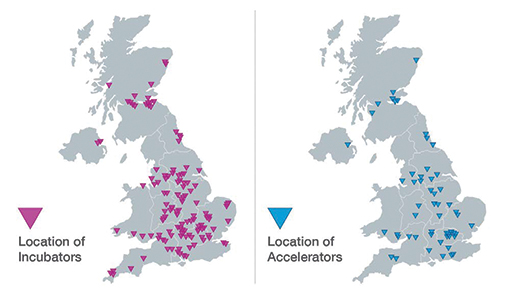3.3 Dilemma 3: finding support
Your idea may require you to take on premises and employees from the outset. However, for many small businesses and start-ups, their growth will be more gradual until they literally outgrow their own resources.
The entrepreneur community is known for the concept of ‘paying it forward’ – in other words, recognising the help, advice and support they have received personally, they are willing to provide the same for others. In this spirit, a growing number of organisational opportunities have arisen for entrepreneurs and investors to step in to provide an infrastructure that brings together entrepreneurs in the early stages of their ventures, and start-ups, usually supported by a programme to help them grow. There are a variety of set-ups and models for these, including incubators, accelerators and co-working spaces.
Incubators, which are typically physical work spaces, may also provide training, mentors, access to commercial networks and equipment. They may be rent free, or charge rent or even a membership fee. Often they may have a particular sector focus (e.g. biotech). Many are aligned with universities or enterprise development agencies.
Accelerators are a slightly different concept that appeared more recently based on the original ‘Y Combinator’, which is a US-based programme that began in 2005 to support digital start-ups.
Watch Video 3, which describes a range of providers of accelerators run by Barclays, Lloyds of London and Microsoft, based in London.

Transcript: Video 3 What are accelerators?
[MUSIC PLAYING]
[TEXT ON SCREEN: What are accelerators? How does your programme work?]
[TEXT ON SCREEN: What kind of businesses do you support?]
[MUSIC PLAYING]
[TEXT ON SCREEN: How is your accelerator model different to others?]
[MUSIC PLAYING]
[TEXT ON SCREEN: How can start-ups prepare themselves to be successful in an accelerator?]
[TEXT ON SCREEN: What advice would you give to start-ups on finding the right programme for them?]
[MUSIC PLAYING]
[TEXT ON SCREEN: How would you define success for start-ups on your programme?]
This model of support to start-ups has been replicated all over the world. In addition to the developmental support, accelerators are more focused on and involved with investment and the potential for high growth. For this reason they are more selective and they tend to bring start-ups on to the programme in cohorts, with the aim of developing their business plans, prototypes and pitch to investors. The programme may last anything between three and 12 months. The involvement of investors means that they will usually seek equity in these companies rather than requiring a fee. There may also be mentorship, training and even seed funding (the initial investment) to get the business up and running. Some provide physical workspace and others provide services only. Figure 3 shows the location of accelerators and incubators in the UK.
Co-working spaces are simply that. Beyond a place to work and be in contact with other companies or similar organisations (e.g. some are run as social enterprises) these provide access to networks, and sometimes events and other opportunities to participate in publicity events.

